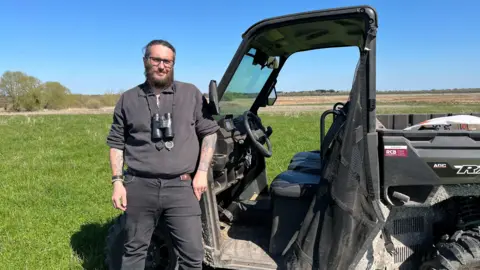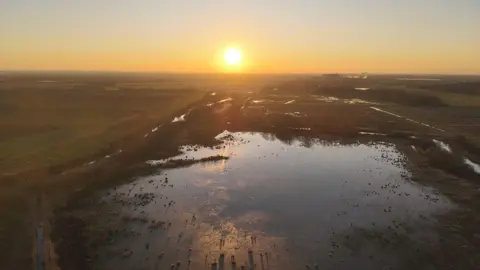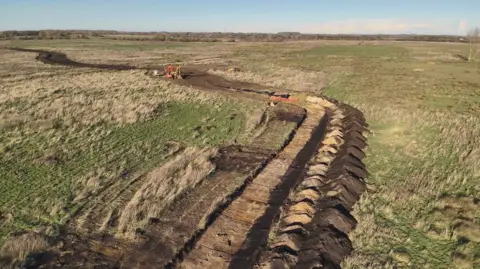Rewilding work aims to restore vital fen wetland
 BBC
BBCA former daffodil farm is to be returned to vital wetland through a rewilding project.
The project at the 292-hectare (721-acre) High Fen site in Methwold, Norfolk, is being undertaken by a private company called Nattergal.
It will be paid for by selling units of biodiversity net gain (BNG) to developers whose projects fail to meet a government target to boost nature.
Matt Hay, natural capital project manager at Nattergal, said the company used private investment to buy degraded land - unsuitable for agriculture - and restore it.
"We are not a charity, we are a for profit company," he said.
"We think if nature recovery is genuinely going to scale to the level we need to have a meaningful impact on the climate crisis, then it needs to be investable."
The soil at High Fen is full of peat, so keeping it wet ensures the containment of stores of carbon.
Mr Hay said the rewilding was very different to preserving sites that were already nature-rich.
"We're not taking sites that are already good for nature and keeping them good," he said.
"We're taking degraded land where we believe the land use has historically not been appropriate and restoring those for nature."
 Frank Street, Nattergal
Frank Street, NattergalKey to the success of the project will be getting the site to stay wetter for longer.
High Fen site manager Frank Street said the creation of an 800m-long (2,625ft) earth embankment was recently completed.
"It has very low permeability," he said.
"We built this on the naturally slightly higher ground. The water won't ever be lapping at the bank but it will just stay, forming deeper pockets as it gets closer to the river banks."
Wetland habitats support a wide range of plants, animals and birds.
Turtle doves, lapwings and cranes have already been spotted on the site.
 Frank Street, Nattergal
Frank Street, NattergalThe National Farmers' Union (NFU) saysthere is no single definition of rewilding.
Charles Hesketh, NFU regional policy manager for the East of England, said most farmers were already undertaking projects for the benefit of nature that could be defined as rewilding.
"There's obviously a bit more of it happening now than there perhaps was five or 10 years ago," he said.
"There's a mixed reception among the farming community. It can be a bit of a Marmite topic within agriculture."
Follow Norfolk news on BBC Sounds, Facebook, Instagram and X.
